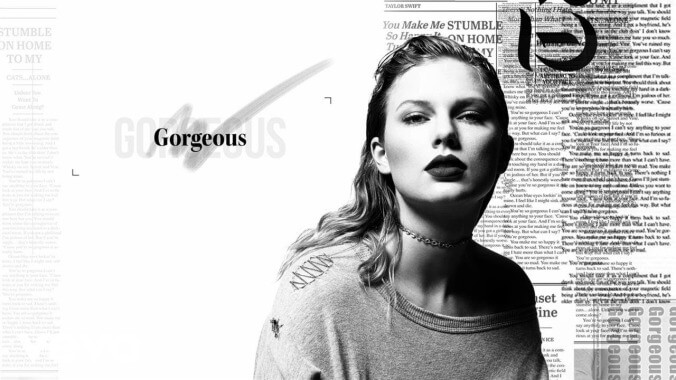Taylor Swift has a big, drunken night out on Reputation

The definitive song of the first era of Taylor Swift’s career is 2008’s “Love Story,” a heart-in-throat Dashboard Confessional anthem that has the artistic audacity to re-envision Romeo And Juliet with a happy ending. Swift was going through a typically Swiftian tough relationship at the time, and connected, like many teenagers before her, with the story of Shakespeare’s star-crossed lovers. But she wondered, as she later told the Los Angeles Times, “Why can’t you make it a happy ending and put a key change in the song and turn it into a marriage proposal?” The result is a delirious, swooning masterpiece of teenage emotion. In its spinning, starry climax, she’s picking out a white dress, her crumbling real-world relationship transformed into true-blue romance, tragedy wished away through sheer force of melody.
This is Taylor Swift’s signature move: flipping a narrative inside out, such that real-world heartbreaks and beefs become fairytale stories, full of unambiguous roses and dresses and snakes and jesters. She wrenches a strange, moving cognitive dissonance out of these images, and the fact that we know that’s not how things generally end up, in our lives or in Swift’s. We know, for example, that “Love Story” was not a true love story, as she is not actively married to Joe Jonas, the supposed subject of the song. The definitive song of the second era of Taylor Swift’s career, “Blank Space,” performed a similar trick, turning her “long list of ex-lovers” into a pledge of devotion to her next one, wrangling her fussed-over reputation for disaster into a flirty winking emoticon.
And this is exactly what she does on the new Reputation, which garbs itself in the black dress of a heel turn but, in a surprise feint, just hops in an Uber to the club instead. All those menacing song titles snake their way toward straightforward romance: “Don’t Blame Me,” she says, she was merely in love; on “Delicate,” she sings, “My reputation’s never been worse… so you must like me for me”; the romance described as a “Getaway Car” ends up being a story of Taylor, hands on the wheel, speeding toward a new horizon. Even the celebrity beefs that she frets over as a sort of ambient menace get flipped narratively. The elliptical Kanye disses on “Look What You Made Me Do” and “This Is Why We Can’t Have Nice Things” transform a narrative that traditionally positions her as the wronged party—her VMA moment ruined by a drunken boor, her phone call recorded against her will—into one where she is again empowered, “taking an ax to a mended fence” and “getting harder in the nick of time.” The old Taylor is very much fine, in other words, despite reports to the contrary.
Of course, the only reason we’re invested in the Swift saga in the first place is her preternatural gifts as a songwriter and composer, and Reputation challenges those skills with her starkest stylistic leap yet. The sparkling, writerly synth-pop of 1989 has been jettisoned almost entirely, replaced by thudding trap beats, Vegas EDM, melancholy Drive-wave synthesizers, and splashes of Miami bass. More often than not, it works. The unlikely “End Game” lets Ed Sheeran and Future do impressions of each other over arena boom-bap, the sort of ungodly-but-good juxtaposition that wouldn’t sound out of place on a Kanye record, while the massive, laser-light chorus of “Dancing With Our Hands Tied” recalls Sia or Carly Rae Jepsen at their most phantasmagoric. The combination of Max Martin’s weapons-grade compression and Jack Antonoff’s whiskey-commercial indie choruses turns Swift’s signature large-hearted romances into Hans Zimmer-scored IMAX epics. To make room, Swift pares her vocal theatrics down to sometimes anonymous-songstress levels, only occasionally finding room to lean into the playful sneers and asides and country affectations that have stuck out on previous records.
Still, it’s a wise move for her furthest foray into fully synthesized pop, stylistically evoking an unconscious slouch into the corner of a strobe-lit club. Ever relatable, she is doing the same thing everyone else is doing at this endless dream of a bar and drinking her way through it. Pretty much every song here fixates on alcohol—seas of champagne, foreboding old fashioneds, drunken hookups and drunken arguments and drunken escapes—but in classic Swift fashion it’s all a shortcut to emotional experience. (“My drug is my baby,” she sings on “Don’t Blame Me,” adding, “I’ll be using for the rest of my life.”) The album, which tells a self-contained narrative as tidy as 1989’s, ends with the ultimate morning-after, “New Year’s Day,” her romantic dreams now scaled to merely being thankful for a guy who’ll stick around to help her clean up the next day.
But despite the apparent dimming of her romantic ambition from “Love Story” to here, it is, as ever with Swift, strangely moving. The setting and soundtrack may’ve changed, but her feelings, and the cosmic scale at which she feels them, remain the same. Her early-career dreams of a white dress turned ardent on Red; on Reputation, the dress is black with seeming malice before, on album highlight “Dress,” it’s tossed to the floor in yet another drunken hookup. And yet, despite all these wardrobe changes, Swift’s essential narrative remains the same, a messy real-time story that she warps into tidy order on her albums. It’s as 2017 an album as you could imagine: a numbing narrative space that blots out the real world, where facts are tidy and stories are digestible and everything feels good enough to keep you entertained, at least until the next thudding chorus hits.
You know what else is like that? A nightclub. At least the beats are good in this one.
Purchasing Reputation via Amazon helps support The A.V. Club.